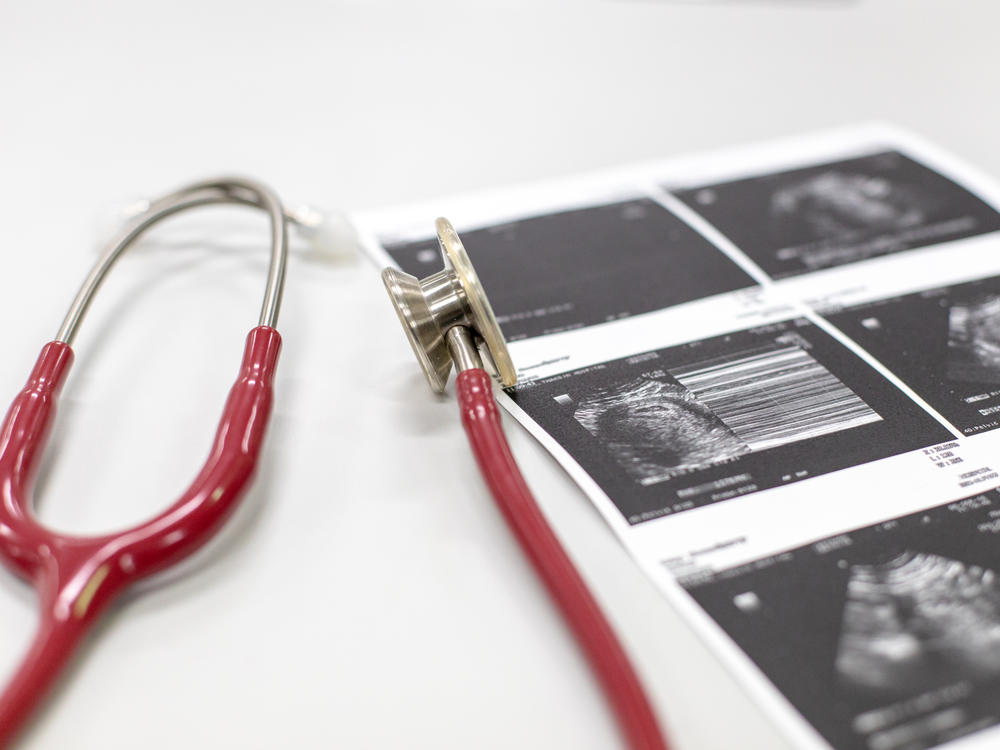Section Branding
Header Content
Syphilis cases are rising in babies. Illinois has a potential solution
Primary Content
Laurie Ayala works out of an office deep in Northwestern Medicine's Prentice Women's Hospital in Chicago, IL. Whenever the small, black landline phone on her desk rings, she answers. This phone is home base for Illinois' Perinatal Syphilis Warmline. Launched in November 2023, the phone line is designed to answer questions about perinatal syphilis from medical professionals across the state.
The phone line was started in response to a dramatic increase in Illinois – and nationwide – in congenital syphilis cases, which occurs when the syphilis infection is passed from mother to baby during pregnancy. There were roughly 4,000 babies born with syphilis in the United States in 2022 – in 2012, that number was 335.
The warmline acts as a triage center for questions about test interpretation, diagnosis and treatment. The perinatal syphilis warmline builds off of Illinois' perinatal HIV hotline, which was started statewide in 2005. These phone lines are a familiar model to Ayala, who has been in public health for 18 years, and worked with the HIV hotline since it started.
"There's nothing like being able to pick up a phone and get a recommendation on your specific patient's situation," Ayala said.
The reasons behind skyrocketing cases are multifactorial. Dr. Helen Cejtin is an OB-GYN at Chicago's John H. Stroger Jr. Hospital. In November, she co-authored a Morbidity and Mortality Weekly Report for the Centers for Disease Control and Prevention looking at how COVID might have impacted congenital syphilis cases in Chicago. The first thing she points to is inadequate testing and prenatal care.
"You have a huge chunk that's just someone not getting prenatal care," says Cejtin. "So why is that happening? Were they ... uninsured, they couldn't get to a doctor, they were homeless, they had no transit?"
The CDC found that about 40% of people who gave birth to babies with congenital syphilis received no prenatal care.
There are also individuals who are getting diagnosed but are either not receiving or completing treatment. Early stage syphilis in a pregnant person can be treated with one injection of Bicillin L-A, a form of penicillin. For later stage syphilis, the recommendation is three injections at intervals of 7-9 days. To be considered effective, treatment needs to be initiated at least a month before delivery.
Medical professionals point to challenging commutes, needing to take time off work and a lack of access to childcare as big barriers to treatment for their patients.
The CDC found that about 90% of the 2022 cases might have been prevented by timely testing and treatment. These barriers to treatment and prenatal care mean that congenital syphilis has a disproportionate impact on marginalized communities.
Dr. Lynn Yee is an associate professor of obstetrics and gynecology at Northwestern University and the medical director of the warmline.
"It becomes concentrated in communities in which people are more underprivileged, less resourced in medical care," she says. "In the United States, that disproportionately means people who are marginalized in other ways."
Yee describes syphilis as syndemic – when two or more illnesses interact with each other – with poverty, structural racism and a lack of access to healthcare.
"It just really emphasizes how our society lets certain communities down over and over again – especially considering how treatable it is," she says.
CDC data shows that babies born to Black, Hispanic and Native mothers mothers were up to 8 times more likely to have newborn syphilis in 2021 than those born to white mothers. Black babies in the U-S have double the mortality rate of white babies. And as far as demographics in terms of who's accessing care – in 2020, Black mothers were twice as likely to receive late or no prenatal care as compared to white mothers.
Interpreting test results to diagnose syphilis and knowing what course of treatment to follow can be challenging for medical professionals who are unfamiliar with the disease. The warmline team hopes to act as a data center, answering questions, searching treatment records and trying to reduce the number of patients who slip through the cracks.
As for other solutions, experts call for increased screening and the potential use of mobile health units that could bring treatment directly to pregnant people. Dr. Yee also stresses the need for broad, policy based solutions.
"What you really need isn't just treatment during pregnancy and public health systems focused on pregnancy, you need systems that help people be as healthy as they possibly can before they even get pregnant," she says.
The Illinois Perinatal Syphilis warmline can be reached at 1-800-439-4079. It operates Monday to Friday, 8am - 4pm CT.
Curious about other public health news? Email us at shortwave@npr.org.
Listen to Short Wave on Spotify, Apple Podcasts and Google Podcasts.
Listen to every episode of Short Wave sponsor-free and support our work at NPR by signing up for Short Wave+ at plus.npr.org/shortwave.
Today's episode was produced by Rachel Carlson. It was edited by Rebecca Ramirez. Rebecca also fact-checked alongside Indira Khera. Patrick Murray and Ko Takasugi-Czernowin were the audio engineers.

